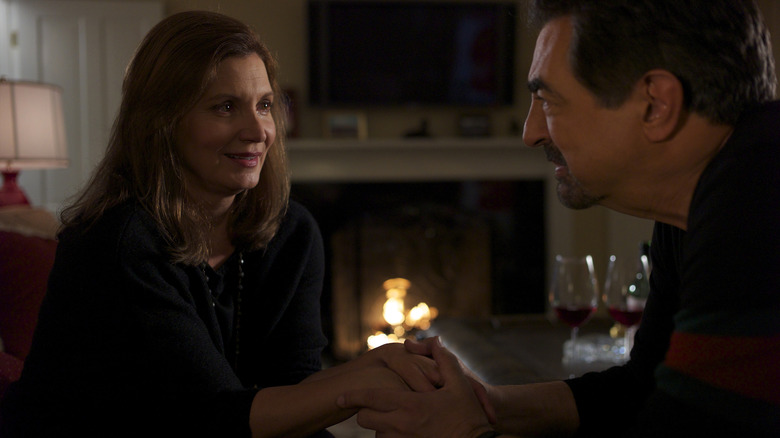Criminal Minds Fans Have A Problem With This Overused Trope In The Show
On a typical episode of "Criminal Minds," the drama begins with an opening scene featuring the episode's unknown subject murdering or kidnapping their way onto the Behavioral Analysis Unit's radar. From there, it's wheels up for the team as they jet off to a typically gruesome crime scene and begin to develop their profile. The drama ticks up a few notches as the team closes in on the "unsub," racing against the clock to prevent another tragedy.
The long-running series, however, doesn't rely solely on its criminals to provide all the drama. Over 15 seasons, the personal lives of the BAU members frequently served as major plot points. Some popular storylines include Spencer Reid's (Matthew Gray-Gubler) relationship with his mother, Derek Morgan's (Shemar Moore) traumatic past, and J.J. Jareau's (A.J. Cook) struggles in balancing home and work life. With so many avenues of drama to travel, it's surprising that the series frequently resorts to a familiar and needless trope.
Criminal Minds relied on "fridging" a bit too much
According to Vox, the term "fridging" was coined by comic book writer Gail Simone in 1999 after she noticed how frequently a female character would be killed, usually in a horrific manner, solely to give a male character the chance to become a hero. Simone specifically noted an instance in which a female character in the "Green Lantern" comic was killed and stuffed into a refrigerator for her boyfriend to find, which then propelled him on his journey of heroism. The "Woman in Refrigerator" trope is sadly all too common in "Criminal Minds."
As Redditor u/roselighters recently noted on the platform, there have been several instances where the "Criminal Minds" writers resorted to fridging. Perhaps one of the most remembered times was the death of Aaron "Hotch" Hotchner's (Thomas Gibson) ex-wife Haley in Season 5. Few fans could forget watching as serial killer Goerge Foyet shot and killed Haley (Meredith Monroe) while he forced Hotch to listen over the phone. The fridging comes into play because the death of Haley prompts Hotch — who was previously a relatively absent father — to grow into the father he needed to be. Hotch's heroic transformation even results in him giving up his career to protect his son.
After Hotch's ex was fridged, Rossi's met the same fate
If that had been the lone act of fridging in the series, fans may have been willing to overlook or accept. However, as stated in the Reddit post, the show's writers pulled out the trope again in Season 7. This time, the victim was David Rossi's (Joe Mantegna) first wife, Carolyn (Isabella Hofmann).
Unseen before the seventh season, Carolyn is introduced to viewers when she reaches out to Rossi to inform him that she has amyotrophic lateral sclerosis, ALS, and is near death. She then asks him to help her end her life. When he refuses, Carolyn takes matters into her own hands and overdoses on pills, dying with Rossi by her side.
While the death didn't send Rossi on a hero's journey, it did provide the character a heartfelt storyline that helped viewers come to know him better. The fridging trope still applies here, as there were certainly other ways to explore Rossi's personal life without killing off his first wife as quickly as she was introduced.
Even Spencer Reid's love interest was fridged
In Season 8, fridging is trotted out again. During the early episodes of the season, Spencer Reid began communicating with a woman named Maeve (Beth Riesgraf), who is mostly homebound due to someone stalking her. As their phone relationship continues, Reid begins to fall in love with Maeve despite never meeting in person. Shortly after they finally meet face to face, Maeve is abducted and killed by her stalker, leaving Reid inconsolable. Much like with Rossi, the fridging here is done to provide an emotional arc for Reid, an arc that could have derived from something other than killing his love interest.
In the Reddit post, u/roselighters admits that while the fridging on "Criminal Minds" is not a deal-breaker, the repeated use of the trope is bothersome. For a rather small team, the majority of the BAU's men have had a love interest killed solely to give the men a challenging heartbreak to overcome, and those women deserved better.



